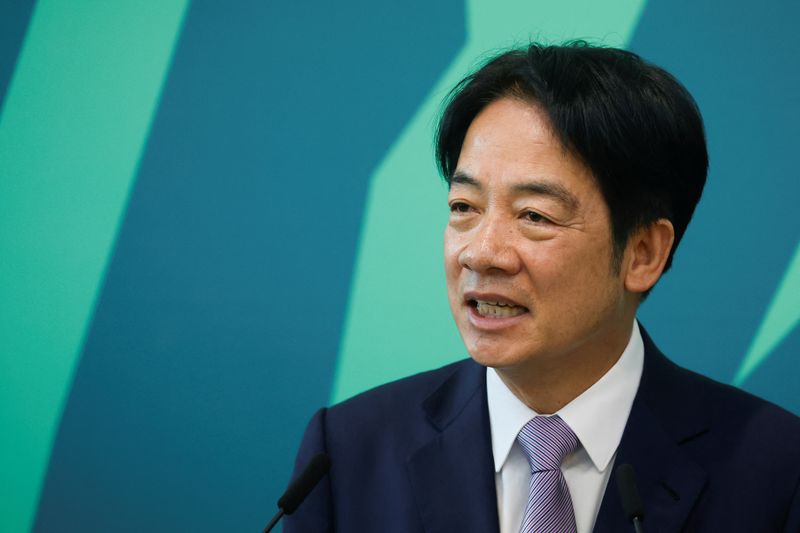By Ben Blanchard and Angie Teo
TAIPEI (Reuters) – In China’s eyes all three Taiwan presidential candidates are separatists, the frontrunner to be the island’s next leader said on Wednesday in a fractious joint televised address with the other contenders.
The Jan. 13 presidential and parliamentary elections will define Chinese-claimed Taiwan’s ties with Beijing, and are happening as China steps up military activities around the island to assert its sovereignty claims.
China has rebuked current Vice President Lai Ching-te, the ruling Democratic Progressive Party’s (DPP) presidential candidate and leading in the polls, as a dangerous separatist, and portrayed the vote as a choice between war and peace.
In a live televised pre-election policy address by the three presidential candidates – an actual debate comes later this month – Lai said China’s desire to “swallow up” Taiwan was the country’s national policy.
“Don’t foolishly allow China to define Taiwan independence,” he said, standing next to the other two candidates, Hou Yu-ih from Taiwan’s largest opposition party the Kuomintang, and former Taipei mayor Ko Wen-je of the much smaller Taiwan People’s Party.
“Mayor Hou and Chairman Ko, in the eyes of China, the three of us standing here running for president are all for Taiwan independence,” Lai added.
Taiwan and China’s governments do not recognise each other and China says Taiwan has to accept they both belong to “one China” for talks to take place, which the DPP-led administration has refused to do, though it has offered talks many times.
Hou, who has been catching up to Lai in the polls, repeated his party’s accusations that Lai wants the island’s formal independence by ditching its formal name of the Republic of China, pointing to previous comments Lai has made about supporting independence.
“Taiwan independence will lead to war, and war is getting closer and closer to us,” said Hou, whose party traditionally favours close ties with China but denies being pro-Beijing.
“I oppose one country, two systems, and I oppose Taiwan independence,” he added, referring to the Hong Kong model of self-governance China has offered to Taiwan, though this enjoys next to no political support on the island.
China passed a law in 2005 giving it the legal basis for military action against Taiwan if it formally secedes or seems about to, and has placed sanctions on senior Taiwan officials, including the foreign minister, it says are separatists.
Taiwan’s government says the Republic of China and People’s Republic of China are “not subordinate” to each other, and that as the Republic of China it is already an independent country. Beijing says this is mere wordplay.
Ko, who has trailed in the polls after talks to form a joint ticket with the KMT collapsed in acrimony last month, made only brief mention of China, concentrating instead on issues like the high cost of housing that has won him support with young voters.
“I hope Taiwan can be a bridge between China and the United States, not a pawn in the confrontation between China and the United States,” he said.
(Reporting by Ben Blanchard and Angie Teo; additional reporting by Roger Tung; editing by Mark Heinrich)
